Submissions: 2023 September
Submissions: 2023 September
__________________________________________________________________________________________________
Please post your images here.
Please see this thread before posting images; posting images demonstrates your agreement with
the possible uses for your image.
If hotlinking to an image, please ensure it is under 500K.
Hotlinks to images over 500K slow down the thread too much and will be disabled.
Thank you!
_________________________________________________________________________________________________
<- Previous submissions
Please post your images here.
Please see this thread before posting images; posting images demonstrates your agreement with
the possible uses for your image.
If hotlinking to an image, please ensure it is under 500K.
Hotlinks to images over 500K slow down the thread too much and will be disabled.
Thank you!
_________________________________________________________________________________________________
<- Previous submissions
Know the quiet place within your heart and touch the rainbow of possibility; be
alive to the gentle breeze of communication, and please stop being such a jerk. — Garrison Keillor
alive to the gentle breeze of communication, and please stop being such a jerk. — Garrison Keillor
Re: Submissions: 2023 September
Here is the M8 and M20 region that I finished up recently and was able to pull detail out that you normally do not see here. For the full size and for image information I have that on my Astrobin here: https://www.astrobin.com/qqsn11/
 M8 M20 Area by Scotty Bishop, on Flickr
M8 M20 Area by Scotty Bishop, on Flickr
 M8 M20 Area by Scotty Bishop, on Flickr
M8 M20 Area by Scotty Bishop, on Flickr-
prashant_naik
- Ensign
- Posts: 26
- Joined: Thu Nov 07, 2019 2:26 am
Re: Submissions: 2023 September
We are here. A humbling view of Earth in the Milky Way Galaxy.
This image beautifully contrasts the effects of light pollution on one side with the untouched, dark sky on the other. On the left, the glow of artificial light obscures the natural brilliance of the night sky depicting the effects of artificial light in our modern world. On the right, an untouched canvas of darkness reveals the Milky Way arch in all it's glory. This striking juxtaposition serves as a reminder of the delicate balance between human development and the preservation of night sky.
Location: Mt Mitchell State Park, North Carolina
Date: 19-Aug-2023
Exif: Sony A7 IV using 16-35mm f2.8 lens. Exposure time 15sec at f2.8; ISO 6400
Post Processing: Raw files processed in Lightroom. 87 vertical images were stitched together in Stereographic projection in PTGui. Color correction and other adjustments were done in Photoshop CC.
Copyright: Prashant Naik
https://naikonpixels.com/
Location: Mt Mitchell State Park, North Carolina
Date: 19-Aug-2023
Exif: Sony A7 IV using 16-35mm f2.8 lens. Exposure time 15sec at f2.8; ISO 6400
Post Processing: Raw files processed in Lightroom. 87 vertical images were stitched together in Stereographic projection in PTGui. Color correction and other adjustments were done in Photoshop CC.
Copyright: Prashant Naik
https://naikonpixels.com/
- PierandreaFolle
- Ensign
- Posts: 23
- Joined: Thu Mar 05, 2020 4:16 pm
Re: Submissions: 2023 September
Summer Countryside
This image was realized in July in south Italy (Otranto).
The sky is a mosaic of 3 panels, each one of 9 photos stacked together.
EXIF
Nikon Z6IIa
VenusLaowa Argus 28mm f/1.2
Sky (3x9)x30sec | f/2.8 | ISO 1600
Foreground 3x60sec | f/5.6 | ISO 3200
Copyright: Pierandrea Folle
This image was realized in July in south Italy (Otranto).
The sky is a mosaic of 3 panels, each one of 9 photos stacked together.
EXIF
Nikon Z6IIa
VenusLaowa Argus 28mm f/1.2
Sky (3x9)x30sec | f/2.8 | ISO 1600
Foreground 3x60sec | f/5.6 | ISO 3200
Copyright: Pierandrea Folle
-
paumontplet
- Ensign
- Posts: 24
- Joined: Sun Aug 27, 2023 4:51 pm
Re: Submissions: 2023 September
Our Solar System. Sun, Mercury, Venus, Moon, Mars, Jupiter, Saturn, Uranus, Neptune.. APOD submission.
Composition that I have taken more than half a year to complete, since Mercury is very difficult to photograph well. Composed of my best images of each planet. Apart of two mosaics of the sun and the moon.
We can se the Sun, our star, with sunspots; Mercury, very difficult to photograph with with some small detail; Venus, planetary (but amazing) hell, in visible light but with some bands of clouds that can be detected; The Moon, our beautiful space companion, with craters and other beautiful details; Mars, the "Red" planet, with some nice detail visible on the surface and some clouds in the in the polar regions; Jupiter, the king of the planets, GRS and Oval BA and, another smalls Ovals, festoons and storms are clearly visible... this planet is amazing and beautiful; Saturn, the lord of the Rings, the treasure of the solar system, a lot of bands are visible, Cassini division and Enke gap are clearly visible; Uranus, with detailed polar region, small seen from Earth but amazing and beautiful; And Neptune, the true blue planet, very small planet seen from Earth, without any detail, but is really spectacular to have a planet so distant and apparently so small in front of us.
Credits: Pau Montplet Sanz
Instagram: @astro_breda
Location of capture: Breda, Spain
Setup: For Sun, Celestron C6. For the other photos, Celestron C11. In both cases the mount is the Skywatcher AzEq6, Player One Mars-C II camera, barlow x2 apo vip baader on planets, 0.5x GSO reducer for Sun and Moon mosaic. And another accessories depends on the circumstances.

Our Solar System. Sun, Mercury, Venus, Moon, Mars, Jupiter, Saturn, Uranus, Neptune.. APOD submission. by Pau Montplet Sanz
https://live.staticflickr.com/65535/531 ... 8ddc_o.jpg
Composition that I have taken more than half a year to complete, since Mercury is very difficult to photograph well. Composed of my best images of each planet. Apart of two mosaics of the sun and the moon.
We can se the Sun, our star, with sunspots; Mercury, very difficult to photograph with with some small detail; Venus, planetary (but amazing) hell, in visible light but with some bands of clouds that can be detected; The Moon, our beautiful space companion, with craters and other beautiful details; Mars, the "Red" planet, with some nice detail visible on the surface and some clouds in the in the polar regions; Jupiter, the king of the planets, GRS and Oval BA and, another smalls Ovals, festoons and storms are clearly visible... this planet is amazing and beautiful; Saturn, the lord of the Rings, the treasure of the solar system, a lot of bands are visible, Cassini division and Enke gap are clearly visible; Uranus, with detailed polar region, small seen from Earth but amazing and beautiful; And Neptune, the true blue planet, very small planet seen from Earth, without any detail, but is really spectacular to have a planet so distant and apparently so small in front of us.
Credits: Pau Montplet Sanz
Instagram: @astro_breda
Location of capture: Breda, Spain
Setup: For Sun, Celestron C6. For the other photos, Celestron C11. In both cases the mount is the Skywatcher AzEq6, Player One Mars-C II camera, barlow x2 apo vip baader on planets, 0.5x GSO reducer for Sun and Moon mosaic. And another accessories depends on the circumstances.

Our Solar System. Sun, Mercury, Venus, Moon, Mars, Jupiter, Saturn, Uranus, Neptune.. APOD submission. by Pau Montplet Sanz
https://live.staticflickr.com/65535/531 ... 8ddc_o.jpg
Last edited by bystander on Sat Sep 02, 2023 10:06 pm, edited 6 times in total.
Reason: Please no hot links to images > 500 kb. Used smaller image.
Reason: Please no hot links to images > 500 kb. Used smaller image.
-
paumontplet
- Ensign
- Posts: 24
- Joined: Sun Aug 27, 2023 4:51 pm
Re: Submissions: 2023 September
The ISS and our Solar System. Sun, Mercury, Venus, Moon, Mars, Jupiter, Saturn, Uranus, Neptune.. APOD submission.
Composition that I have taken more than half a year to complete, since Mercury and the ISS are very difficult to photograph well. Composed of my best images of each planet and the ISS. Apart of two mosaics of the sun and the moon.
We can se the Sun, our star, with sunspots; Mercury, very difficult to photograph with with some small detail; Venus, planetary (but amazing) hell, in visible light but with some bands of clouds that can be detected; The Moon, our beautiful space companion, with craters and other beautiful details; Mars, the "Red" planet, with some nice detail visible on the surface and some clouds in the in the polar regions; Jupiter, the king of the planets, GRS and Oval BA and, another smalls Ovals, festoons and storms are clearly visible... this planet is amazing and beautiful; Saturn, the lord of the Rings, the treasure of the solar system, a lot of bands are visible, Cassini division and Enke gap are clearly visible; Uranus, with detailed polar region, small seen from Earth but amazing and beautiful; Neptune, the true blue planet, very small planet seen from Earth, without any detail, but is really spectacular to have a planet so distant and apparently so small in front of us; And the ISS, the most expensive single object ever created by man is the International Space Station, which after many upgrades, its total cost currently exceeds 150 billion dollars, contributed by 16 countries.
Credits: Pau Montplet Sanz
Instagram: @astro_breda
Location of capture: Breda, Spain
Setup: For Sun, Celestron C6. For the other photos, Celestron C11. In both cases the mount is the Skywatcher AzEq6, Player One Mars-C II camera, barlow x2 apo vip baader on planets, 0.5x GSO reducer for Sun and Moon mosaic. And another accessories depends on the circumstances.

The ISS and our Solar System. Sun, Mercury, Venus, Moon, Mars, Jupiter, Saturn, Uranus, Neptune.. APOD submission. by Pau Montplet Sanz
https://live.staticflickr.com/65535/531 ... 4066_o.jpg
Composition that I have taken more than half a year to complete, since Mercury and the ISS are very difficult to photograph well. Composed of my best images of each planet and the ISS. Apart of two mosaics of the sun and the moon.
We can se the Sun, our star, with sunspots; Mercury, very difficult to photograph with with some small detail; Venus, planetary (but amazing) hell, in visible light but with some bands of clouds that can be detected; The Moon, our beautiful space companion, with craters and other beautiful details; Mars, the "Red" planet, with some nice detail visible on the surface and some clouds in the in the polar regions; Jupiter, the king of the planets, GRS and Oval BA and, another smalls Ovals, festoons and storms are clearly visible... this planet is amazing and beautiful; Saturn, the lord of the Rings, the treasure of the solar system, a lot of bands are visible, Cassini division and Enke gap are clearly visible; Uranus, with detailed polar region, small seen from Earth but amazing and beautiful; Neptune, the true blue planet, very small planet seen from Earth, without any detail, but is really spectacular to have a planet so distant and apparently so small in front of us; And the ISS, the most expensive single object ever created by man is the International Space Station, which after many upgrades, its total cost currently exceeds 150 billion dollars, contributed by 16 countries.
Credits: Pau Montplet Sanz
Instagram: @astro_breda
Location of capture: Breda, Spain
Setup: For Sun, Celestron C6. For the other photos, Celestron C11. In both cases the mount is the Skywatcher AzEq6, Player One Mars-C II camera, barlow x2 apo vip baader on planets, 0.5x GSO reducer for Sun and Moon mosaic. And another accessories depends on the circumstances.

The ISS and our Solar System. Sun, Mercury, Venus, Moon, Mars, Jupiter, Saturn, Uranus, Neptune.. APOD submission. by Pau Montplet Sanz
https://live.staticflickr.com/65535/531 ... 4066_o.jpg
Last edited by paumontplet on Sat Sep 02, 2023 4:05 pm, edited 2 times in total.
-
paumontplet
- Ensign
- Posts: 24
- Joined: Sun Aug 27, 2023 4:51 pm
Re: Submissions: 2023 September
The Solar System to Scale (APOD submission)
Composition to scale that I have taken more than half a year to complete, since Mercury is very difficult to photograph well. Composed of my best images of each planet and a mosaic of the Sun. The photo of Earth isn't mine, is from NASA, but all other photos (sun, other planets, and moon) are mine.
We can see the Sun, Mercury, Venus, the Earth (this photo is not mine, is from NASA), the Moon,Mars, the "Red" planet, Jupiter, the king of the planets, GRS and Oval BA and, another smalls Ovals, festoons and storms are clearly visible... this planet is amazing and beautiful; Saturn, the lord of the Rings, the treasure of the solar system, a lot of bands are visible, Cassini division and Enke gap are clearly visible; Uranus, with detailed polar region, And Neptune, the true blue planet, very small planet seen from Earth, without any detail, but is really spectacular to have a planet so distant and apparently so small in front of us.
Credits: Pau Montplet Sanz
Instagram: @astro_breda
Location of capture: Breda, Spain
Setup: For Sun, Celestron C6. For the other photos, Celestron C11. In both cases the mount is the Skywatcher AzEq6, Player One Mars-C II camera, barlow x2 apo vip baader on planets, 0.5x GSO reducer for Sun and Moon mosaic. And another accessories depends on the circumstances.
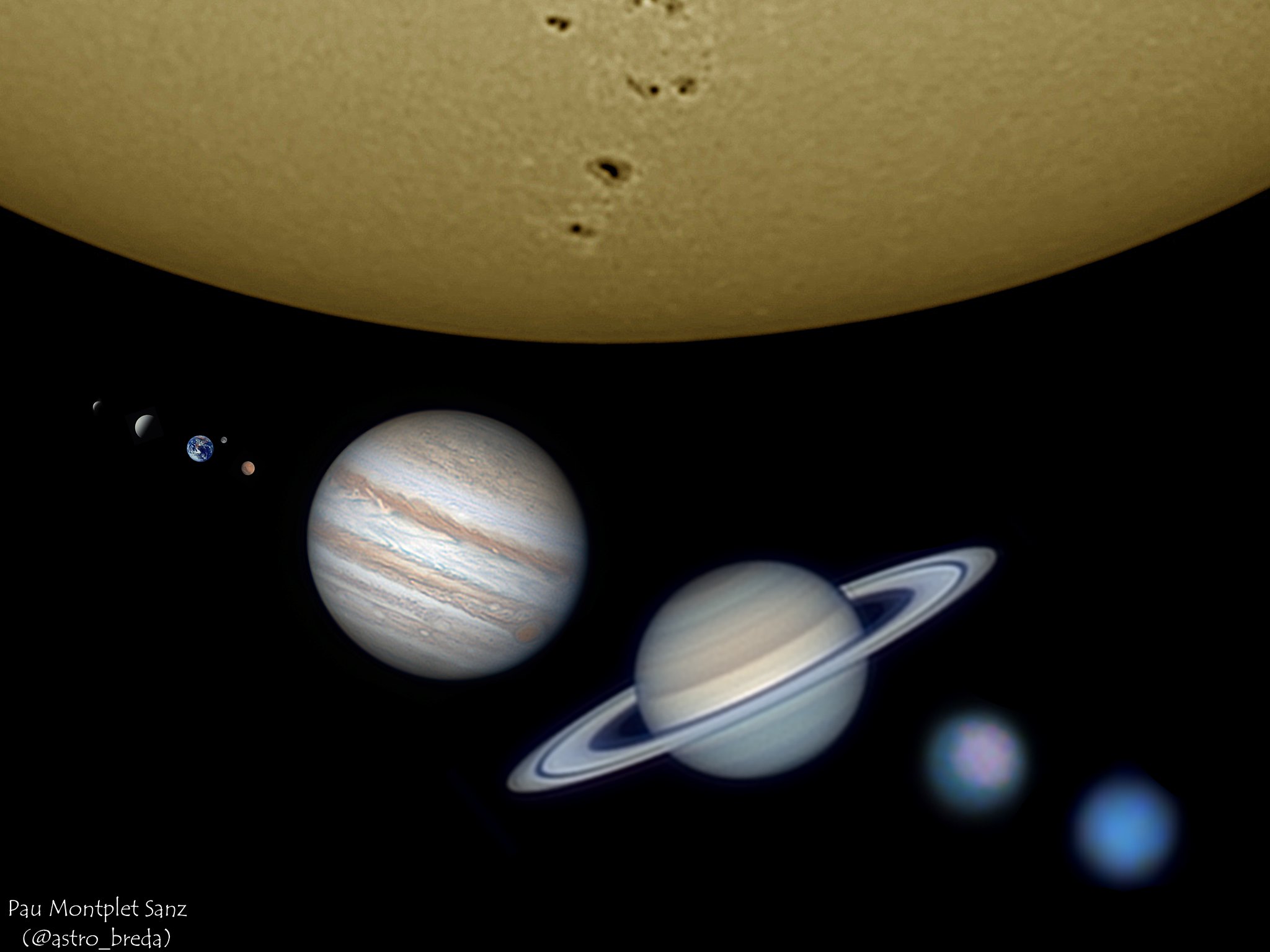 The Solar System to Scale (APOD submission) by Pau Montplet Sanz
The Solar System to Scale (APOD submission) by Pau Montplet Sanz
Composition to scale that I have taken more than half a year to complete, since Mercury is very difficult to photograph well. Composed of my best images of each planet and a mosaic of the Sun. The photo of Earth isn't mine, is from NASA, but all other photos (sun, other planets, and moon) are mine.
We can see the Sun, Mercury, Venus, the Earth (this photo is not mine, is from NASA), the Moon,Mars, the "Red" planet, Jupiter, the king of the planets, GRS and Oval BA and, another smalls Ovals, festoons and storms are clearly visible... this planet is amazing and beautiful; Saturn, the lord of the Rings, the treasure of the solar system, a lot of bands are visible, Cassini division and Enke gap are clearly visible; Uranus, with detailed polar region, And Neptune, the true blue planet, very small planet seen from Earth, without any detail, but is really spectacular to have a planet so distant and apparently so small in front of us.
Credits: Pau Montplet Sanz
Instagram: @astro_breda
Location of capture: Breda, Spain
Setup: For Sun, Celestron C6. For the other photos, Celestron C11. In both cases the mount is the Skywatcher AzEq6, Player One Mars-C II camera, barlow x2 apo vip baader on planets, 0.5x GSO reducer for Sun and Moon mosaic. And another accessories depends on the circumstances.
 The Solar System to Scale (APOD submission) by Pau Montplet Sanz
The Solar System to Scale (APOD submission) by Pau Montplet Sanz-
paumontplet
- Ensign
- Posts: 24
- Joined: Sun Aug 27, 2023 4:51 pm
Re: Submissions: 2023 September
Moon, planets, and sun (and me). The Solar System to Scale (APOD submission)
Composition to scale that I have taken more than half a year to complete, since Mercury is very difficult to photograph well. Composed of my best images of each planet, a mosaic of the sun, and a photo of me and my telescope (i'm not to scale )
)
We can see the Sun, Mercury, Venus, Me and my telescope, the Celestron C11, the Moon (up the telescope), Mars, the "Red" planet, Jupiter, the king of the planets, GRS and Oval BA and, another smalls Ovals, festoons and storms are clearly visible... this planet is amazing and beautiful; Saturn, the lord of the Rings, the treasure of the solar system, a lot of bands are visible, Cassini division and Enke gap are clearly visible; Uranus, with detailed polar region, And Neptune, the true blue planet, very small planet seen from Earth, without any detail, but is really spectacular to have a planet so distant and apparently so small in front of us.
Credits: Pau Montplet Sanz
Instagram: @astro_breda
Location of capture: Breda, Spain
Setup: For Sun, Celestron C6. For the other photos, Celestron C11. In both cases the mount is the Skywatcher AzEq6, Player One Mars-C II camera, barlow x2 apo vip baader on planets, 0.5x GSO reducer for Sun and Moon mosaic. And another accessories depends on the circumstances.

Moon, planets, and sun. The Solar System to Scale (APOD submission) by Pau Montplet Sanz
https://live.staticflickr.com/65535/531 ... 9596_o.jpg
Composition to scale that I have taken more than half a year to complete, since Mercury is very difficult to photograph well. Composed of my best images of each planet, a mosaic of the sun, and a photo of me and my telescope (i'm not to scale
We can see the Sun, Mercury, Venus, Me and my telescope, the Celestron C11, the Moon (up the telescope), Mars, the "Red" planet, Jupiter, the king of the planets, GRS and Oval BA and, another smalls Ovals, festoons and storms are clearly visible... this planet is amazing and beautiful; Saturn, the lord of the Rings, the treasure of the solar system, a lot of bands are visible, Cassini division and Enke gap are clearly visible; Uranus, with detailed polar region, And Neptune, the true blue planet, very small planet seen from Earth, without any detail, but is really spectacular to have a planet so distant and apparently so small in front of us.
Credits: Pau Montplet Sanz
Instagram: @astro_breda
Location of capture: Breda, Spain
Setup: For Sun, Celestron C6. For the other photos, Celestron C11. In both cases the mount is the Skywatcher AzEq6, Player One Mars-C II camera, barlow x2 apo vip baader on planets, 0.5x GSO reducer for Sun and Moon mosaic. And another accessories depends on the circumstances.

Moon, planets, and sun. The Solar System to Scale (APOD submission) by Pau Montplet Sanz
https://live.staticflickr.com/65535/531 ... 9596_o.jpg
Last edited by bystander on Sat Sep 02, 2023 10:11 pm, edited 1 time in total.
Reason: Please no hot links to images > 500 kb. Used smaller image.
Reason: Please no hot links to images > 500 kb. Used smaller image.
Re: Submissions: 2023 September
Hi everyone,
Here is a picture from the Italian Alps, at 2800 m.
It's a single exposure of 10s with a 24mm 1.4.
We can spot M55, M22, M7, the Lagoon and Trifid nebulas
There was also green airglow, emitted by atomic oxygen, on the left.
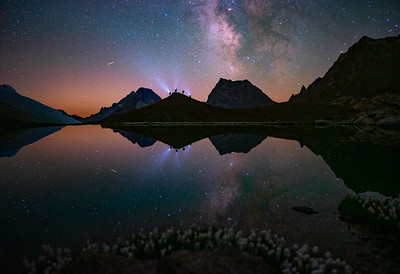 Lagoon on another planet by Clément Brustel, Flickr
Lagoon on another planet by Clément Brustel, Flickr
Here is a picture from the Italian Alps, at 2800 m.
It's a single exposure of 10s with a 24mm 1.4.
We can spot M55, M22, M7, the Lagoon and Trifid nebulas
There was also green airglow, emitted by atomic oxygen, on the left.
 Lagoon on another planet by Clément Brustel, Flickr
Lagoon on another planet by Clément Brustel, FlickrRe: Submissions: 2023 September
Although NOT a planet...it still moves...
Pluto's movement in August 2023...
Full frame:
https://pbase.com/tango33/image/173942745/original
Kfir Simon
Pluto's movement in August 2023...
Full frame:
https://pbase.com/tango33/image/173942745/original
Kfir Simon
Re: Submissions: 2023 September

Solar System in One Week
My photos of our Solar System from this week: the Blue Supermoon, Saturn at opposition (with Titan, Rhea, and Iapetus), and Jupiter with its four Galilean moons (Io, Europa, Ganymede and Callisto). I represent the Gas Giants as they appeared through the eyepiece of my 8 inch Dobsonian telescope. The challenge is the wide dynamic range between the light of the very bright planets and their much fainter moons. Our eyes are able to overcome this dynamic range, but cameras struggle with capturing both the satellites and the details of their planets in a single exposure. To solve this issue I used an HDR composite technique.
Location: Des Plaines, Illinois
Date: August 28 and September 1, 2023
Copyright: Imran Sultan
Re: Submissions: 2023 September

Full resolution:
https://www.dropbox.com/scl/fi/v314vgcx ... 238j&raw=1
I have tried to make a so-called "mineral moon", where the colors are greatly enhanced, which can show some of the areas on the Moon where certain minerals are concentrated.
Some of the minerals found on the Moon's surface are iron oxide, titanium dioxide, magnesium oxide, aluminum oxide, silicon dioxide, sodium oxide, calcium oxide and many more.
Blue colors indicate high concentration of titanium, orange-red iron and the other colors are a mixture of different minerals.
I took about 3300 in total pictures with R, G and B filters (about 60 GB of data)
Telescope: 10" f/5 ATM newton
Mount: Sky-Watcher NEQ6 Pro
Camera: ZWO ASI1600MM-Pro
Filters: R, G and B
Software: FireCapture + AutoStakkert + Astroart + Affinity Photo
Photographed friday the 2'nd of september 2023 from Svendborg, Denmark.
More info: https://www.astrobin.com/qet7sm/
Last edited by bystander on Sun Sep 03, 2023 2:58 pm, edited 1 time in total.
Reason: Please no hot links to images > 500 kb. Used smaller image.
Reason: Please no hot links to images > 500 kb. Used smaller image.
-
paumontplet
- Ensign
- Posts: 24
- Joined: Sun Aug 27, 2023 4:51 pm
Re: Submissions: 2023 September
We are so small... (Solar System to Scale, full sun)
This is a composition of the planets, sun and our moon to scale.
All images are mine except the image of the earth which is from NASA. Images captured for more than half a year. They are also my best images of each object..
Mercury is very very small, is difficult to see in the image. It's amazing how small we are compared to the sun, and how small the sun is compared to other stars...It's even scary, hehehe...
Credits: Nasa (Earth image)
Pau Montplet Sanz (all the other images)
Instagram: @astro_breda
Location of capture: Breda, Spain
Date of capture: without a specific date, over more than half a year
Setup: For Sun, Celestron C6. For the other photos, Celestron C11. In both cases the mount is the Skywatcher AzEq6, Player One Mars-C II camera, barlow x2 apo vip baader on planets, 0.5x GSO reducer for Sun and Moon mosaic. And another accessories depends on the circumstances.
Images processed in Astrosurface and Winjupos, composition created on photoshop using a google image for size reference.
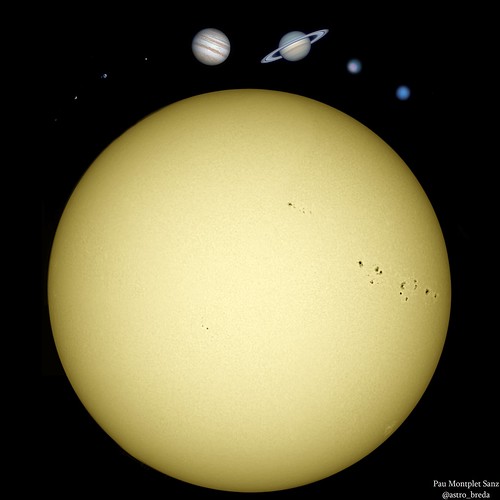 We are so small... (Solar System to Scale, full sun) by Pau Montplet Sanz, en Flickr
We are so small... (Solar System to Scale, full sun) by Pau Montplet Sanz, en Flickr
This is a composition of the planets, sun and our moon to scale.
All images are mine except the image of the earth which is from NASA. Images captured for more than half a year. They are also my best images of each object..
Mercury is very very small, is difficult to see in the image. It's amazing how small we are compared to the sun, and how small the sun is compared to other stars...It's even scary, hehehe...
Credits: Nasa (Earth image)
Pau Montplet Sanz (all the other images)
Instagram: @astro_breda
Location of capture: Breda, Spain
Date of capture: without a specific date, over more than half a year
Setup: For Sun, Celestron C6. For the other photos, Celestron C11. In both cases the mount is the Skywatcher AzEq6, Player One Mars-C II camera, barlow x2 apo vip baader on planets, 0.5x GSO reducer for Sun and Moon mosaic. And another accessories depends on the circumstances.
Images processed in Astrosurface and Winjupos, composition created on photoshop using a google image for size reference.
 We are so small... (Solar System to Scale, full sun) by Pau Montplet Sanz, en Flickr
We are so small... (Solar System to Scale, full sun) by Pau Montplet Sanz, en Flickr-
paumontplet
- Ensign
- Posts: 24
- Joined: Sun Aug 27, 2023 4:51 pm
Re: Submissions: 2023 September
Solar System to scale (and me and my telescope), a game of marbles.
This is a composition of the Planets, and Sun to scale, I can't take a photo of earth, so I put one photo, me with my friend. We are not to scale with the other objects
All images are mine. Images captured for more than half a year. They are also my best images of each object..
Can you see Mercury??, is difficult to see in the image. It's amazing how small we are compared to the sun. Seeing images like this is when we realize that we are literally nothing.
Credits: Pau Montplet Sanz
Instagram: @astro_breda
Location of capture: Breda, Spain
Date of capture: without a specific date, over more than half a year
Setup: For Sun, Celestron C6. For the other photos, Celestron C11. In both cases the mount is the Skywatcher AzEq6, Player One Mars-C II camera, barlow x2 apo vip baader on planets, 0.5x GSO reducer for Sun and Moon mosaic. And other accessories depend on the circumstances.
Images of planets / sun processed in Astrosurface and Winjupos, composition created on photoshop using a google image for size reference.
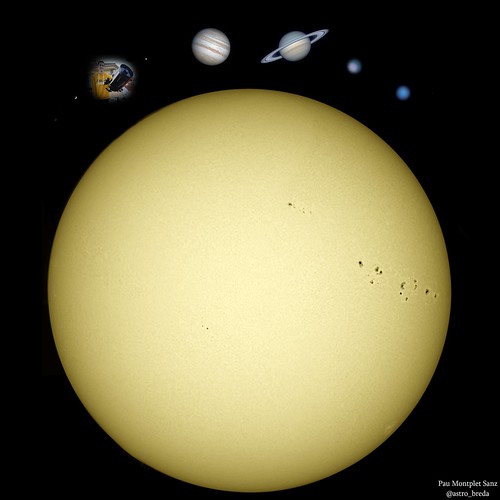 Solar System to scale (and me and my telescope), a game of marbles. by Pau Montplet Sanz, en Flickr
Solar System to scale (and me and my telescope), a game of marbles. by Pau Montplet Sanz, en Flickr
This is a composition of the Planets, and Sun to scale, I can't take a photo of earth, so I put one photo, me with my friend. We are not to scale with the other objects
All images are mine. Images captured for more than half a year. They are also my best images of each object..
Can you see Mercury??, is difficult to see in the image. It's amazing how small we are compared to the sun. Seeing images like this is when we realize that we are literally nothing.
Credits: Pau Montplet Sanz
Instagram: @astro_breda
Location of capture: Breda, Spain
Date of capture: without a specific date, over more than half a year
Setup: For Sun, Celestron C6. For the other photos, Celestron C11. In both cases the mount is the Skywatcher AzEq6, Player One Mars-C II camera, barlow x2 apo vip baader on planets, 0.5x GSO reducer for Sun and Moon mosaic. And other accessories depend on the circumstances.
Images of planets / sun processed in Astrosurface and Winjupos, composition created on photoshop using a google image for size reference.
 Solar System to scale (and me and my telescope), a game of marbles. by Pau Montplet Sanz, en Flickr
Solar System to scale (and me and my telescope), a game of marbles. by Pau Montplet Sanz, en Flickr-
paumontplet
- Ensign
- Posts: 24
- Joined: Sun Aug 27, 2023 4:51 pm
Re: Submissions: 2023 September
All are balls, one very big, other smalls
This is a composition of the planets, sun and our moon.
Solar System to Scale. One section for the Sun and planets to scale, and another section for only the planets to scale for more details on the images.
All images are mine except the image of the earth which is from NASA. Images captured for more than half a year. They are also my best images of each object..
Mercury is very very small, is difficult to see in the image, our moon too.
Credits: Nasa (Earth image)
Pau Montplet Sanz (all the other images)
Instagram: @astro_breda
Location of capture: Breda, Spain
Date of capture: without a specific date, over more than half a year
Setup: For Sun, Celestron C6. For the other photos, Celestron C11. In both cases the mount is the Skywatcher AzEq6, Player One Mars-C II camera, barlow x2 apo vip baader on planets, 0.5x GSO reducer for Sun and Moon mosaic. And another accessories depends on the circumstances.
Images processed in Astrosurface and Winjupos, composition created on photoshop using a google image for size reference.
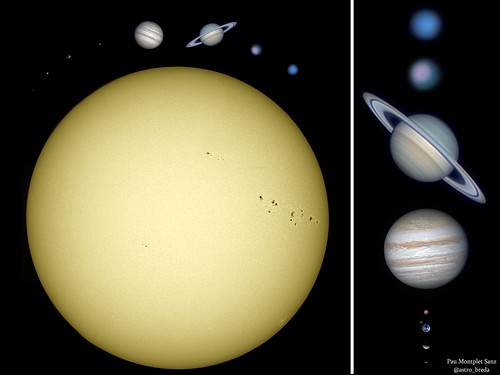 All are balls, one very big, other smalls by Pau Montplet Sanz, en Flickr
All are balls, one very big, other smalls by Pau Montplet Sanz, en Flickr
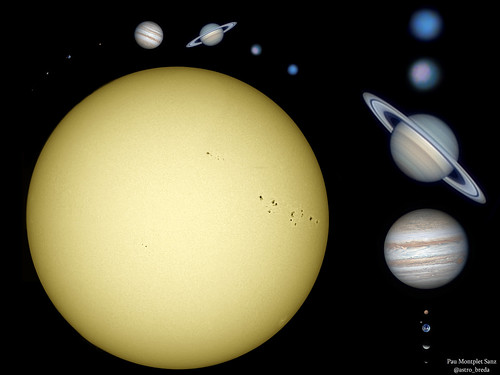 All are balls, one very big, other smalls by Pau Montplet Sanz, en Flickr
All are balls, one very big, other smalls by Pau Montplet Sanz, en Flickr
This is a composition of the planets, sun and our moon.
Solar System to Scale. One section for the Sun and planets to scale, and another section for only the planets to scale for more details on the images.
All images are mine except the image of the earth which is from NASA. Images captured for more than half a year. They are also my best images of each object..
Mercury is very very small, is difficult to see in the image, our moon too.
Credits: Nasa (Earth image)
Pau Montplet Sanz (all the other images)
Instagram: @astro_breda
Location of capture: Breda, Spain
Date of capture: without a specific date, over more than half a year
Setup: For Sun, Celestron C6. For the other photos, Celestron C11. In both cases the mount is the Skywatcher AzEq6, Player One Mars-C II camera, barlow x2 apo vip baader on planets, 0.5x GSO reducer for Sun and Moon mosaic. And another accessories depends on the circumstances.
Images processed in Astrosurface and Winjupos, composition created on photoshop using a google image for size reference.
 All are balls, one very big, other smalls by Pau Montplet Sanz, en Flickr
All are balls, one very big, other smalls by Pau Montplet Sanz, en Flickr All are balls, one very big, other smalls by Pau Montplet Sanz, en Flickr
All are balls, one very big, other smalls by Pau Montplet Sanz, en Flickr-
paumontplet
- Ensign
- Posts: 24
- Joined: Sun Aug 27, 2023 4:51 pm
Re: Submissions: 2023 September
Gravity is wonderful. Spheres here, spheres there, big, small...
Solar System to scale (and me and my telescope not to scale hehehe)
This is a composition of the Planets, and Sun to scale, I can't take a photo of earth, so I put one photo, me with my friend. We are not to scale with the other objects
All images are mine. Images captured for more than half a year. They are also my best images of each object..
Can you see Mercury??, is difficult to see in the image, you can see it "better" in the side image!. It's amazing how small we are compared to the sun. And hpw small are de sun compared to other stars... Seeing images like this is when we realize that we are literally nothing.
Credits: Pau Montplet Sanz
Instagram: @astro_breda
Location of capture: Breda, Spain
Date of capture: without a specific date, over more than half a year
Setup: For Sun, Celestron C6. For the other photos, Celestron C11. In both cases the mount is the Skywatcher AzEq6, Player One Mars-C II camera, barlow x2 apo vip baader on planets, 0.5x GSO reducer for Sun and Moon mosaic. And other accessories depend on the circumstances.
Images of planets / sun processed in Astrosurface and Winjupos, composition created on photoshop using a google image for size reference.
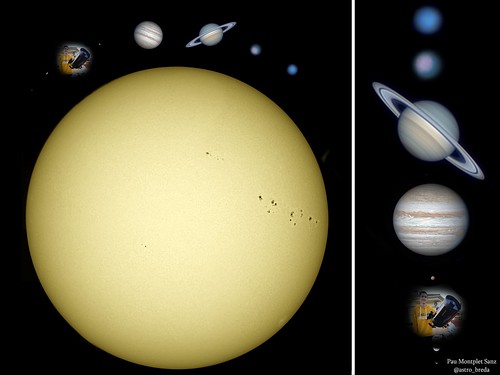 Gravity is wonderful. Spheres here, spheres there, big, small... by Pau Montplet Sanz, en Flickr
Gravity is wonderful. Spheres here, spheres there, big, small... by Pau Montplet Sanz, en Flickr
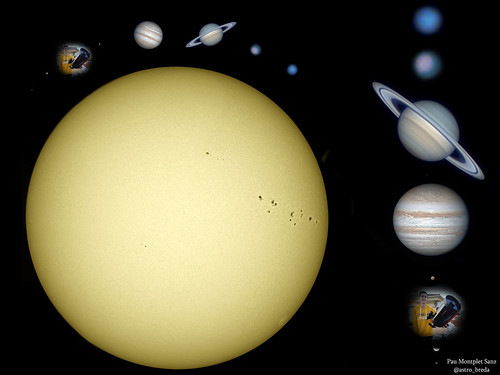 Gravity is wonderful. Spheres here, spheres there, big, small... by Pau Montplet Sanz, en Flickr
Gravity is wonderful. Spheres here, spheres there, big, small... by Pau Montplet Sanz, en Flickr
Solar System to scale (and me and my telescope not to scale hehehe)
This is a composition of the Planets, and Sun to scale, I can't take a photo of earth, so I put one photo, me with my friend. We are not to scale with the other objects
All images are mine. Images captured for more than half a year. They are also my best images of each object..
Can you see Mercury??, is difficult to see in the image, you can see it "better" in the side image!. It's amazing how small we are compared to the sun. And hpw small are de sun compared to other stars... Seeing images like this is when we realize that we are literally nothing.
Credits: Pau Montplet Sanz
Instagram: @astro_breda
Location of capture: Breda, Spain
Date of capture: without a specific date, over more than half a year
Setup: For Sun, Celestron C6. For the other photos, Celestron C11. In both cases the mount is the Skywatcher AzEq6, Player One Mars-C II camera, barlow x2 apo vip baader on planets, 0.5x GSO reducer for Sun and Moon mosaic. And other accessories depend on the circumstances.
Images of planets / sun processed in Astrosurface and Winjupos, composition created on photoshop using a google image for size reference.
 Gravity is wonderful. Spheres here, spheres there, big, small... by Pau Montplet Sanz, en Flickr
Gravity is wonderful. Spheres here, spheres there, big, small... by Pau Montplet Sanz, en Flickr Gravity is wonderful. Spheres here, spheres there, big, small... by Pau Montplet Sanz, en Flickr
Gravity is wonderful. Spheres here, spheres there, big, small... by Pau Montplet Sanz, en FlickrRe: Submissions: 2023 September
Desolate tree and volcano of southern Chile.
Copyright: Marcelo Maturana Rodríguez (@matuutex)
Location: Vicente Pérez Rosales National Park, Lakes Region, Chile
Date: 28 May 2023
Instagram: @matuutex
Nikon d5600, Tokina lens 14/20mm f2
Foreground: 14mm f2 iso 2000 20 segs Sky: 35mm f1.8 iso 2500
Vertical panorama (3 Photos)

Desolate tree and volcano of southern Chile. by Marcelo Maturana, en Flickr
https://live.staticflickr.com/65535/531 ... 9d9d_h.jpg
Copyright: Marcelo Maturana Rodríguez (@matuutex)
Location: Vicente Pérez Rosales National Park, Lakes Region, Chile
Date: 28 May 2023
Instagram: @matuutex
Nikon d5600, Tokina lens 14/20mm f2
Foreground: 14mm f2 iso 2000 20 segs Sky: 35mm f1.8 iso 2500
Vertical panorama (3 Photos)

Desolate tree and volcano of southern Chile. by Marcelo Maturana, en Flickr
https://live.staticflickr.com/65535/531 ... 9d9d_h.jpg
Last edited by bystander on Sun Sep 03, 2023 4:11 pm, edited 1 time in total.
Reason: Please no hot links to images > 500 kb. Used smaller image.
Reason: Please no hot links to images > 500 kb. Used smaller image.
-
barretosmed
- Science Officer
- Posts: 484
- Joined: Thu Oct 12, 2017 6:04 pm
Re: Submissions: 2023 September
CENTAURUS A --- NGC 5128
The central region of the Centaurus A galaxy, located just 11 million light-years from Earth, encompasses a tangle of events.
Its central region encompasses clusters of blue stars and gigantic cosmic dust.
The main theory about Centaurus A would be the collision between two galaxies, one elliptical and the other spiral, which were consumed by a central black hole
BEST DETAILS:
https://www.astrobin.com/full/2hc23j/C/
EQUIPMENT:
Esprit 150mm triplet
Zwo asi 6200mc
Mount CEM120
Frames 270X300"
LOCATION: Munhoz - MG - Brazil
DATES: From 03/26/2023 to 06/12/2023
PROCESSING AND CAPTURE:
Adobe Photoshop, ASTAP, SGP, PHD2 and PixInsight
Author: Fernando Oliveira de Menezes
Email: Barretosmed@hotmail.com
The central region of the Centaurus A galaxy, located just 11 million light-years from Earth, encompasses a tangle of events.
Its central region encompasses clusters of blue stars and gigantic cosmic dust.
The main theory about Centaurus A would be the collision between two galaxies, one elliptical and the other spiral, which were consumed by a central black hole
BEST DETAILS:
https://www.astrobin.com/full/2hc23j/C/
EQUIPMENT:
Esprit 150mm triplet
Zwo asi 6200mc
Mount CEM120
Frames 270X300"
LOCATION: Munhoz - MG - Brazil
DATES: From 03/26/2023 to 06/12/2023
PROCESSING AND CAPTURE:
Adobe Photoshop, ASTAP, SGP, PHD2 and PixInsight
Author: Fernando Oliveira de Menezes
Email: Barretosmed@hotmail.com
Re: Submissions: 2023 September
Hello Orion Hello Aurora
Aurora and orion shot in iceland Vesterhorn
Panorama V2, Canon EOS ra in RGBHA
Credit Roi Levi\USA - https://www.instagram.com/astroi_levi/?hl=en
Orion & Aurora In The North Pole
By Roi Levi @astroi_levi
Educational Post, Technical Details:
H alpha 20 sec X 13 Frames Iso 6400
RGB 1 Frames 13 Sec Exposure iso 800 X4 frames for panorama
Shot with Canon Eos R astro modified Camera
Using a Fast Lens Sigma Art 14mm of F1.8
Story:
i always enjoyed the night skies, i started astro photography following Robert Gandler Work and learned more about space objects and the frequencies they contained,
Today I teach Astrophotography Workshops with Texas Astronomical Soicety and privet workshops worldwide in Utah califronia USA Iceland and middle east with deepspaceworkshops.
The mission to capture something new that have not captured before is a hard mission, my goal was to capture Aurora and Orion was a hard mission that need the right conditions to align .
Need a no moon night need aurora and I needed clear skies .
I went to Iceland with intentions to capture that frame, knowing if I’ll make both RGB frame and H alpha frame, I’ll be able to get a lot of details from the night skies.
As technology evolves and astro photography filters become more accessible, we can now start to see new combinations of astrophotography from the city or from places never seen before. Combining space objects with northern lights by using one exposure without filter and one exposure with an H alpha filter - without moving the camera, we capture more photons and more frequencies of color enhancement in the right places and document space and time in a more accurate way.
On oct 25 2022 in Iceland I had the right conditions. The clouds started to clear and I managed to capture Orion and the Aurora with the most detailed shot ever been taking of aurora and orion together thanks to the new filter technology.
Website
https://deepspaceworkshops.com/
Facebook
https://m.facebook.com/RoiLeviPhotography
Instegram
https://www.instagram.com/astroi_levi/?hl=en
Aurora and orion shot in iceland Vesterhorn
Panorama V2, Canon EOS ra in RGBHA
Credit Roi Levi\USA - https://www.instagram.com/astroi_levi/?hl=en
Orion & Aurora In The North Pole
By Roi Levi @astroi_levi
Educational Post, Technical Details:
H alpha 20 sec X 13 Frames Iso 6400
RGB 1 Frames 13 Sec Exposure iso 800 X4 frames for panorama
Shot with Canon Eos R astro modified Camera
Using a Fast Lens Sigma Art 14mm of F1.8
Story:
i always enjoyed the night skies, i started astro photography following Robert Gandler Work and learned more about space objects and the frequencies they contained,
Today I teach Astrophotography Workshops with Texas Astronomical Soicety and privet workshops worldwide in Utah califronia USA Iceland and middle east with deepspaceworkshops.
The mission to capture something new that have not captured before is a hard mission, my goal was to capture Aurora and Orion was a hard mission that need the right conditions to align .
Need a no moon night need aurora and I needed clear skies .
I went to Iceland with intentions to capture that frame, knowing if I’ll make both RGB frame and H alpha frame, I’ll be able to get a lot of details from the night skies.
As technology evolves and astro photography filters become more accessible, we can now start to see new combinations of astrophotography from the city or from places never seen before. Combining space objects with northern lights by using one exposure without filter and one exposure with an H alpha filter - without moving the camera, we capture more photons and more frequencies of color enhancement in the right places and document space and time in a more accurate way.
On oct 25 2022 in Iceland I had the right conditions. The clouds started to clear and I managed to capture Orion and the Aurora with the most detailed shot ever been taking of aurora and orion together thanks to the new filter technology.
Website
https://deepspaceworkshops.com/
https://m.facebook.com/RoiLeviPhotography
Instegram
https://www.instagram.com/astroi_levi/?hl=en
Re: Submissions: 2023 September
Comet Nishimura over the volcano-shaped Mountains,
The Black desert
Date :26 Aug 23
Comet C/2023 P1 (Nishimura)
In western Egyptian Desert, there is a region of volcano-shaped and widely separated mounds known as the Black Desert. The majority of its mounds have basalt sills on top, giving them their distinctive black colour.
Comet Nishimura shines over the Black Mountains, announcing its appearance, and is currently shining near sunrise
These mountains belong to a volcanic activity millions of years ago in this region, which has now become inactive...but this comet does not care about this and revolves over millions of years as well to come and say hello.
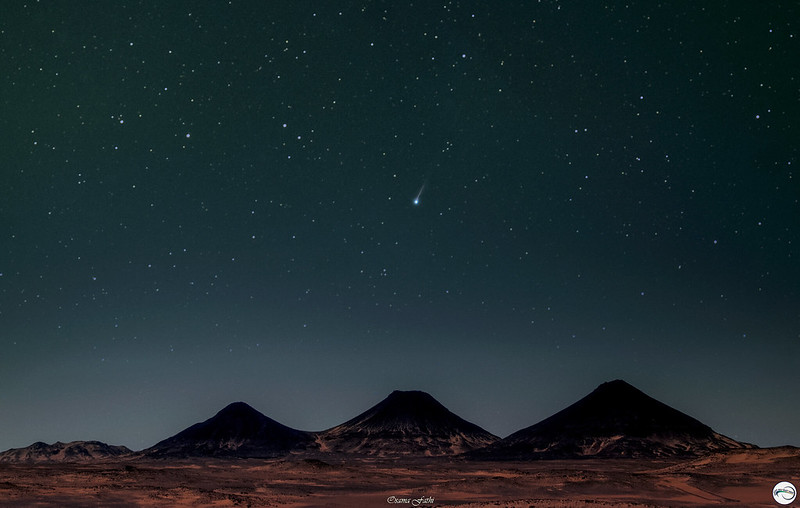 Comet Nishimura over the volcano-shaped Mountains, The Black desert by osama Fathi, on Flickr
Comet Nishimura over the volcano-shaped Mountains, The Black desert by osama Fathi, on Flickr
Gears :
Nikon Z6 (Mod) , RedCat51 , Skywatcher Staradventurer 2i
EXIF:
Lights :Comet tracked and stacked : 25*1 min , Iso 2500,
Darks:25, Flats :40, Dark Flats: 20, Bias :50
Foreground: Blue hour 2.5 Sec, ISO 1250
Credit :
Osama Fathi / https://www.instagram.com/osama.fathi.nswatcher85/
Social:
https://www.instagram.com/osama.fathi.nswatcher85/
https://www.facebook.com/NSWatcher/
the Black desert, Egypt
The Black desert
Date :26 Aug 23
Comet C/2023 P1 (Nishimura)
In western Egyptian Desert, there is a region of volcano-shaped and widely separated mounds known as the Black Desert. The majority of its mounds have basalt sills on top, giving them their distinctive black colour.
Comet Nishimura shines over the Black Mountains, announcing its appearance, and is currently shining near sunrise
These mountains belong to a volcanic activity millions of years ago in this region, which has now become inactive...but this comet does not care about this and revolves over millions of years as well to come and say hello.
 Comet Nishimura over the volcano-shaped Mountains, The Black desert by osama Fathi, on Flickr
Comet Nishimura over the volcano-shaped Mountains, The Black desert by osama Fathi, on FlickrGears :
Nikon Z6 (Mod) , RedCat51 , Skywatcher Staradventurer 2i
EXIF:
Lights :Comet tracked and stacked : 25*1 min , Iso 2500,
Darks:25, Flats :40, Dark Flats: 20, Bias :50
Foreground: Blue hour 2.5 Sec, ISO 1250
Credit :
Osama Fathi / https://www.instagram.com/osama.fathi.nswatcher85/
Social:
https://www.instagram.com/osama.fathi.nswatcher85/
https://www.facebook.com/NSWatcher/
the Black desert, Egypt
Re: Submissions: 2023 September
This pictures shows the sunrise behind Cerro Armazones with the building site of the ELT, the largest telescope in the world, currently being built in Chile, close to Antofagasta. The picture was taken on August 28, 2023 at just past 6am, from the Paranal Observatory Site, where ESO currently runs the VLTs, VLTI, VST and VISTA (and hosts a few more telescopes).
These pictures can only be taken twice a year, when the sun aligns perfectly at sunrise, but this one is extremely special. At the last opportunity, the dome was not more than wall, at the next opportunity, it will be closed. So this was the only chance to get this shot with the frame of the dome in front of the sun. With the 2 large sunspots, the setup looks like one telescope-sized smiley.
There's also a timelapse of this sunset, which you can see here:
https://www.eso.org/public/unitedkingdo ... 336a/?lang
EXIF:
Sony A7III with Sony GM 100-400mm lens and 1.4Teleconverter == 560mm (and cropped further), and a sunfilter.
Exposure time: 1/30s
Aperture: f/10
I regularly upload timelapses (mostly) from the Paranal platform to my Youtube Channel:
https://www.youtube.com/@BorisHaeussler
These pictures can only be taken twice a year, when the sun aligns perfectly at sunrise, but this one is extremely special. At the last opportunity, the dome was not more than wall, at the next opportunity, it will be closed. So this was the only chance to get this shot with the frame of the dome in front of the sun. With the 2 large sunspots, the setup looks like one telescope-sized smiley.
There's also a timelapse of this sunset, which you can see here:
https://www.eso.org/public/unitedkingdo ... 336a/?lang
EXIF:
Sony A7III with Sony GM 100-400mm lens and 1.4Teleconverter == 560mm (and cropped further), and a sunfilter.
Exposure time: 1/30s
Aperture: f/10
I regularly upload timelapses (mostly) from the Paranal platform to my Youtube Channel:
https://www.youtube.com/@BorisHaeussler
- Chris Peterson
- Abominable Snowman
- Posts: 18612
- Joined: Wed Jan 31, 2007 11:13 pm
- Location: Guffey, Colorado, USA
- Contact:
Re: Submissions: 2023 September
Comet C/2023 P1 Nishimura
This is a tricky object to capture, because it is quite close to the Sun in the sky. There is a narrow window of about an hour before morning twilight wipes it out. Luckily, it is very bright and does show up against a somewhat light sky. This comet is likely to reach naked eye brightness, but whether it will be visible during twilight is uncertain.
Details:
QSI 660 camera on 250mm RC, Astronomic RGB filters
7 minutes each RGB (30-second subs)
Processed with PixInsight and Photoshop
Final image resolution 0.93 arcsec/pixel, 21 arcminute wide field
_
This is a tricky object to capture, because it is quite close to the Sun in the sky. There is a narrow window of about an hour before morning twilight wipes it out. Luckily, it is very bright and does show up against a somewhat light sky. This comet is likely to reach naked eye brightness, but whether it will be visible during twilight is uncertain.
Details:
QSI 660 camera on 250mm RC, Astronomic RGB filters
7 minutes each RGB (30-second subs)
Processed with PixInsight and Photoshop
Final image resolution 0.93 arcsec/pixel, 21 arcminute wide field
_
Chris
*****************************************
Chris L Peterson
Cloudbait Observatory
https://www.cloudbait.com
*****************************************
Chris L Peterson
Cloudbait Observatory
https://www.cloudbait.com
-
Luismi_Azorin
- Asternaut
- Posts: 2
- Joined: Mon Aug 28, 2023 3:18 pm
Re: Submissions: 2023 September
"A window to the stars"
Credit: Luis Miguel Azorin - Natural Portraits Project (www.naturalportraits.es - https://www.instagram.com/natural_portraits)
Explanation: In August I spent some days in a centenary monastery in Teruel (Spain). Monasterio el Olivar is a privileged place where it's possible to be in contact with the nature and to observe the stars as in few other places. I discovered that my bedroom window was pointing to the Perseid's radiant, so I placed my camera and I configured it to capture images during all the night. The result is this image: an original framing of the Perseids through a privileged window.
Gear: Sony A6400 with Tokina 11-16 f2.8, working at 14mm. 900 photos processed with Nebulb to detect and to stack the Perseids and Luminar NEO to finish the photo.
More resolution: https://www.naturalportraits.es/wp-cont ... entana.jpg
Credit: Luis Miguel Azorin - Natural Portraits Project (www.naturalportraits.es - https://www.instagram.com/natural_portraits)
Explanation: In August I spent some days in a centenary monastery in Teruel (Spain). Monasterio el Olivar is a privileged place where it's possible to be in contact with the nature and to observe the stars as in few other places. I discovered that my bedroom window was pointing to the Perseid's radiant, so I placed my camera and I configured it to capture images during all the night. The result is this image: an original framing of the Perseids through a privileged window.
Gear: Sony A6400 with Tokina 11-16 f2.8, working at 14mm. 900 photos processed with Nebulb to detect and to stack the Perseids and Luminar NEO to finish the photo.
More resolution: https://www.naturalportraits.es/wp-cont ... entana.jpg
Last edited by bystander on Wed Sep 06, 2023 3:27 am, edited 1 time in total.
Reason: Please no hot links to images > 500 kb. Uploaded image as an attachment.
Reason: Please no hot links to images > 500 kb. Uploaded image as an attachment.
-
MallowFDT
Re: Submissions: 2023 September

An extremely large speck of dust in the morning sky - ELT sunrise from VLT by E. Garcés, on Flickr
Name: An extremely large speck of dust in the morning sky - ELT sunrise from VLT
Description: While this might not be the only picture taken of the Extremely Large Telescope (ELT) at Cerro Armazones with the sun rising behind it, it is one of the last ones taken from the Very Large Telescope summit in Cerro Paranal during the 2023.
Indeed, August 28th and 29th marked the final opportunity for the sun to be aligned between the two summits at sunrise during this year. Moreover, this occurrence might be unique since it's unlikely to be repeated with a naked ELT dome, which is advancing fast in its construction. Next time the same alignment occurs, the dome will most certainly be complete and fully covered by metal. Additionally, two sunspots are visible as well, as if the Sun’s eyes were just peeking behind the telescope.
The picture was taken on August 29th, at ~07:03hrs (UT -4, Chilean winter time).

